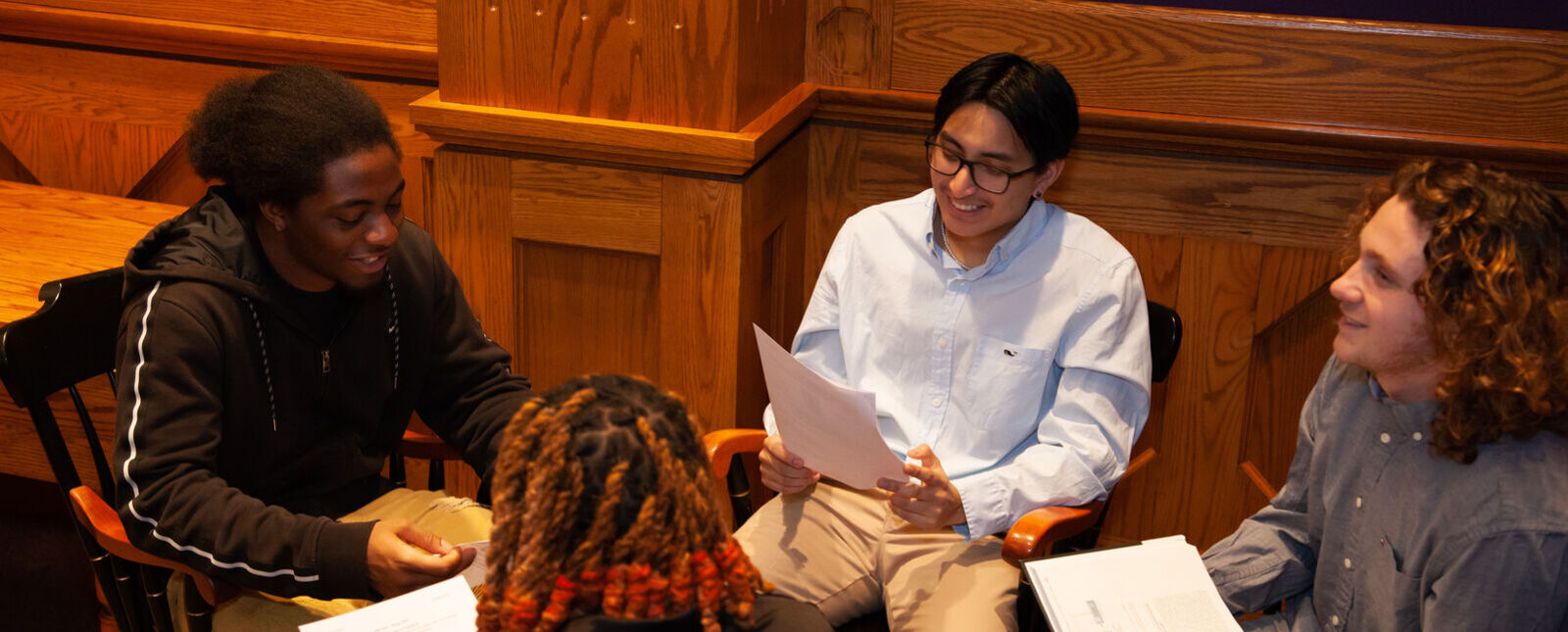Campus Map
The EC campus map can help you find your way around campus and find the best parking spot.
With over 35 majors and minor areas of concentration, Elmira College lays the foundation for a diverse, cross discipline education, encouraging you to both specialize and explore.

Area of Study
Concentration/Minor
Focus
Degree
Accounting
FocusUndergraduate
Major
Minor
Bachelors
DegreeBS
Actuarial & Financial Science
FocusUndergraduate
Major
Bachelors
DegreeBS
Art
Concentration/MinorArt Therapy
Art Education
Digital Art and Graphic Design
Digital Art and Product Design
Studio Art
FocusUndergraduate
Major
Minor
Bachelors
DegreeBS
BA
Biochemistry
FocusUndergraduate
Major
Bachelors
DegreeBS
BA
Biology
Concentration/MinorEvolution, Ecology, and Behavior
General
Molecular
Medical
FocusUndergraduate
Major
Minor
Bachelors
DegreeBS
BA
BS/DO
FocusUndergraduate
Bachelors
DegreeBS
Business Administration
Concentration/MinorDigital Marketing
Esports and Gaming Administration
Fashion Marketing
Fashion Merchandising
Fashion Business Generalist
General
IT Management
Marketing
Management
Sports Management
FocusUndergraduate
Major
Minor
Associates
Bachelors
DegreeBS
AS
Cannabis Associate Certificate
FocusNon-Credit Certificate
Cannabis Specialist Certificates
Concentration/MinorCannabis Cultivation Specialist,
Cannabis Product Development Specialist
Cannabis Retail & Sales Specialist
Cannabis Compliance Specialist
Medical Cannabis Specialist
FocusNon-Credit Certificate
Chemistry
Concentration/MinorGeneral
Professional Chemistry
FocusUndergraduate
Major
Minor
Bachelors
DegreeBS
BA
Communication Sciences & Disorders
FocusUndergraduate
Major
Minor
Bachelors
DegreeBS
Communications, Media Studies, & Design
FocusUndergraduate
Major
Minor
Bachelors
DegreeBS
BA
Criminal Justice
Concentration/MinorComprehensive Criminal Justice
Corrections
Cybersecurity
Pre-Law
FocusUndergraduate
Major
Minor
Bachelors
DegreeBS
Criminal Science
FocusUndergraduate
Major
Minor
Bachelors
DegreeBS
BA
Cybersecurity
FocusUndergraduate
Minor
Data Analytics
FocusUndergraduate
Minor
Economics
FocusUndergraduate
Minor
Education
Concentration/MinorChildhood Special Education
Childhood Education
Adolescence Education
Art Education
Educational Studies
FocusUndergraduate
Major
Bachelors
DegreeBS
BA
Education, MSEd
Concentration/MinorLiteracy: Birth to 12
General Education
Adolescence Education 7-12
Inclusive Special Education
FocusGraduate
Masters
DegreeMS
English Literature
FocusUndergraduate
Major
Minor
Bachelors
DegreeBA
Environmental Science
FocusUndergraduate
Major
Minor
Bachelors
DegreeBS
BA
Finance
FocusUndergraduate
Major
Minor
Bachelors
DegreeBS
Forensic Science
FocusUndergraduate
Major
Minor
Bachelors
DegreeBS
General Studies
FocusUndergraduate
Major
Bachelors
DegreeBS
Health Sciences
History
FocusUndergraduate
Major
Minor
Bachelors
DegreeBS
BA
Human Services
FocusUndergraduate
Major
Associates
Bachelors
DegreeBS
AS
Individualized Studies
FocusUndergraduate
Major
Bachelors
DegreeBS
BA
Legal Studies
FocusUndergraduate
Minor
Mathematics
Concentration/MinorEducation
Mathematical Sciences
FocusUndergraduate
Major
Minor
Bachelors
DegreeBS
BA
Media Studies, Communications & Design
FocusUndergraduate
Major
Minor
Bachelors
DegreeBS
BA
Medical Humanities
FocusUndergraduate
Minor
Medical Laboratory Science
FocusUndergraduate
Major
Bachelors
DegreeBS
Nursing
FocusUndergraduate
Major
Bachelors
DegreeBS
Politics & Society
FocusMinor
Post-Baccalaureate MLS Program
Post-Baccalaureate Pre-Medical Program
Pre-Athletic Training
FocusUndergraduate
Minor
Pre-Health
Pre-Law
Psychology
FocusUndergraduate
Major
Bachelors
DegreeBS
BA
Public Health
FocusMinor
Social Studies
FocusUndergraduate
Major
Bachelors
DegreeBS
BA
Social Work
FocusUndergraduate
Major
Bachelors
DegreeBS
Sociology & Anthropology
FocusUndergraduate
Major
Minor
Bachelors
DegreeBS
BA
Speech & Hearing
FocusUndergraduate
Major
Minor
Bachelors
DegreeBS
Speech & Language Disabilities
FocusUndergraduate
Major
Bachelors
DegreeBS
BA
Sustainability
FocusUndergraduate
Minor
Theatre
FocusUndergraduate
Major
Minor
Bachelors
DegreeBA
Undeclared
FocusUndergraduate
Major
Women's & Gender Studies
FocusUndergraduate
Minor